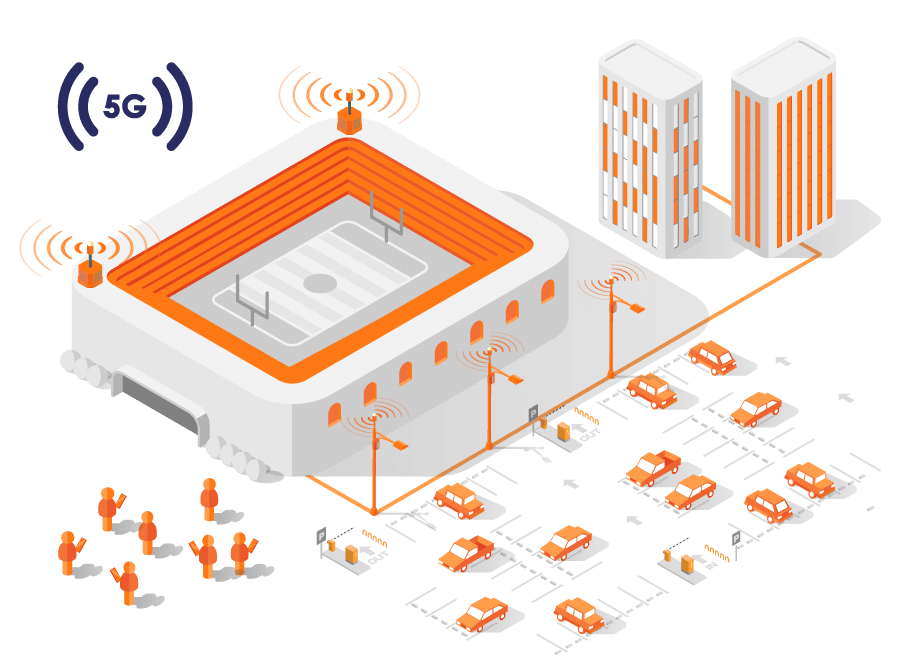In today’s fast-paced digital world, connectivity is the lifeblood of businesses. It keeps operations running smoothly, customers satisfied, and growth on track. But as businesses evolve, traditional networks often fall short. Enter private wireless networks, a game-changing technology set to revolutionize how businesses connect, communicate, and operate.
Understanding Private Wireless Networks
What Are Private Wireless Networks?
Private wireless networks are bespoke communication systems tailored to meet the specific needs of an organization. Unlike public networks, which are shared among many users, private networks are dedicated solely to the entity that owns them. This exclusivity offers enhanced control, security, and performance.
How Do They Differ from Traditional Networks?
Traditional networks, particularly public Wi-Fi and standard cellular networks are often plagued with issues like congestion, security vulnerabilities, and limited customization. Private wireless networks, on the other hand, provide a controlled environment where the network’s parameters can be finely tuned to suit specific requirements. This makes them ideal for businesses that need reliable, secure, and high-performance connectivity.
Advantages for Small Businesses
For small businesses, the benefits of private wireless networks are manifold. First and foremost is security. With a private network, businesses can ensure that their data remains protected from external threats. Secondly, these networks offer better performance, as they are not affected by the congestion commonly seen in public networks. Lastly, private networks provide greater flexibility and scalability, allowing businesses to tailor their connectivity solutions to their evolving needs.
Potential Challenges
However, adopting private wireless networks is not without its challenges. One of the main hurdles is the initial cost of setup and deployment. While the long-term benefits often outweigh these costs, the upfront investment can be significant. Additionally, managing and maintaining a private network requires specialized knowledge and skills, which may necessitate additional training or hiring of new personnel.
The Future of Connectivity
Trends Driving the Need for Private Wireless Networks
Several trends are contributing to the growing demand for private wireless networks. The proliferation of IoT devices, for instance, is placing unprecedented demands on existing networks. These devices require reliable, high-speed connections to function effectively, something that private wireless networks are well-equipped to provide. Additionally, the rise of remote work and the need for secure, efficient communication channels are further driving the adoption of private networks.
Real-World Examples
Numerous businesses across various industries are already reaping the benefits of private wireless networks. For example, manufacturing plants are using these networks to connect their machinery and automate processes, resulting in increased efficiency and reduced downtime. Similarly, hospitals are leveraging private networks to ensure seamless communication between medical devices, improving patient care and operational efficiency.
Implementing Private Wireless Networks
Steps for Small Businesses
Adopting a private wireless network involves several key steps. First, businesses need to conduct a thorough assessment of their current and future connectivity needs. This includes evaluating the number of devices that will be connected, the types of applications that will be used, and the level of security required. Next, they need to choose the right technology and infrastructure, which may involve purchasing specialized equipment and software. Finally, businesses must ensure that their staff are adequately trained to manage and maintain the network.
Cost Considerations
While the cost of implementing a private wireless network can be substantial, it’s important to consider the potential return on investment (ROI). In many cases, the increased efficiency, enhanced security, and improved performance offered by private networks can lead to significant cost savings over time. Additionally, businesses may be able to offset some of the initial costs through government grants or other financial incentives.
Potential ROI
The ROI of private wireless networks can be impressive. For instance, businesses that implement these networks often see a reduction in downtime, which translates into increased productivity and revenue. Furthermore, the enhanced security provided by private networks can help prevent costly data breaches and other cyber threats. Over time, these benefits can more than justify the initial investment.
Beyond Business: Private Networks in the Tech Community
Impact on Communities and Industries
The impact of private wireless networks extends beyond individual businesses. In the tech community, these networks are driving innovation and enabling new applications across various industries. For example, in the smart city sector, private networks are being used to connect sensors and other devices, facilitating real-time monitoring and management of urban infrastructure. Similarly, in the healthcare industry, private networks are supporting telemedicine and other remote care solutions, improving access to healthcare services.
Emerging Technologies
Private wireless networks are also playing a crucial role in the development of emerging technologies. For instance, the deployment of 5G networks relies heavily on private infrastructure and cloud connectivity to ensure reliable, high-speed connections. Additionally, technologies like augmented reality (AR) and virtual reality (VR) are increasingly dependent on private networks to deliver seamless, immersive experiences.
Conclusion
Now that we have explored the concept of private wireless networks and their potential impact, it’s clear that these networks offer significant advantages for businesses of all sizes. While there may be challenges involved in adopting and managing a private network, the benefits far outweigh the costs.
Also Read: https://usatimenetwork.com/




